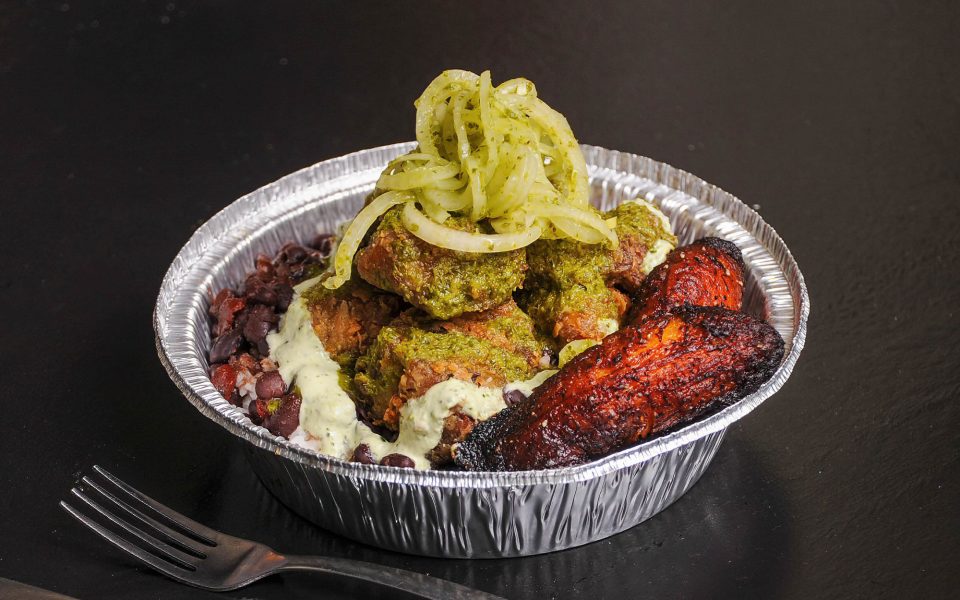Featured photo: Mojito in Winston-Salem serves up fusion food like their masitas, or fried pork chunks bowl (courtesy photo)
When Michael Milan first visited Winston-Salem in the early 2000s, he remembers driving into the city and thinking it looked like something out of a comic book.
“As I was driving into Winston from 52, and it looked Gotham City to me,” he says.
When Millan and his wife Michelle arrived in 2008 they found the city to be intriguing. They noted the low cost of living, how homeownership, establishing a savings fund and raising a family all seemed possible in Winston-Salem compared to their hometown of Miami. Millan calls himself a typical Cuban from Hialeah, a city in the Miami metropolitan area, and was a hotel chef in South Florida before moving to North Carolina.
“Being a hotel chef, I made decent money,” he says over the phone. “But when the bills came around every month, the money flew out of the window.”

Millan is the co-owner of Mojito Latin Soul Food, a restaurant located in Winston-Salem. In 2017, Millan and his wife started their first concept, Mojito Mobile Kitchen food truck which developed a loyal base of customers who knew them for their Cuban food. Having been a partner at Mary’s Gourmet Diner for several years, Millan knew how to run a kitchen and a food business. In 2020, when they opened the brick-and-mortar restaurant, they wanted to move past what they had been pigeonholed into. They aimed to bring other Latin-American influences into their menu.
The menu at Mojito Latin Soul Food is a tour of food across the Caribbean and Latin America. It boasts Cuban staples such as the Cubano sandwich and sweet Cuban bread, but also tamales from Mexico, arepas from Colombia and Venezuela, and even an Argentinian-style pizza, a special menu item on some nights.

thinking it looked like something out of a comic book.
The diverse collection is a reflection of Millan’s multicultural upbringing. He was a first-generation Cuban-American youth growing up in Miami who initially learned how to cook from his Japanese uncle.
His uncle owned a Japanese sushi house in Coral Gables, near Miami. At 14, Millan was washing dishes at the restaurant.
“I felt close to my uncle,” recalls Millan, whose chickens croak in the background of the phone call. “I felt I could be myself there and nobody there ever made me feel stupid or that a question was unwarranted.”
In his own restaurant now, he uses flavors from his cultural roots and other Latin American countries and remixes them. A tamale, which usually means a corn-based dough filled with various meats in a chili sauce wrapped in a corn husk, looks different at Mojito. Theirs is open, with the corn husk supporting a cornmeal dough — no unwrapping necessary.
Even the toppings are outside of the norm. Black beans, fried onion straws, mojito sauce, cilantro-lime cream and cotija cheese all mesh with pork, creating an ingenious flavor combination that surprises and satisfies.

Millan explains that the remixes are a reflection of his experience working as a young cook in various Miami hotel kitchens in the ’90s. He remembers how the guys he cooked with brought familial dishes to work. They would share with each other, creating an informal, yet worldly potluck.
“The hotels in Miami, you get people from all over the world,” he explains. “Working in the hotel, I was meeting people from the Middle East, from Africa, from places in the Caribbean I didn’t know existed.”
And that kind of surprising variety is what Millan wants his patrons to experience.
“I don’t want you to come to my restaurant and have something you had at a particular restaurant,” he says. “I want you to have a variation that I have put a spin on.”
Despite the issues of the last two years including a pandemic, increasing supply costs and inflation, Millan is hopeful about the future of his business.
“I’ve met my goals,” he says. “I want something sustainable to be able to hand over to my kids and the next generation. We want to show people how much we do to put really beautiful food on your plate.”
Mojitos is located at 723 N. Trade St. in Winston-Salem. Learn more about the hours and menu at mojitolatinsoulfood.com.
Join the First Amendment Society, a membership that goes directly to funding TCB‘s newsroom.
We believe that reporting can save the world.
The TCB First Amendment Society recognizes the vital role of a free, unfettered press with a bundling of local experiences designed to build community, and unique engagements with our newsroom that will help you understand, and shape, local journalism’s critical role in uplifting the people in our cities.
All revenue goes directly into the newsroom as reporters’ salaries and freelance commissions.


Leave a Reply